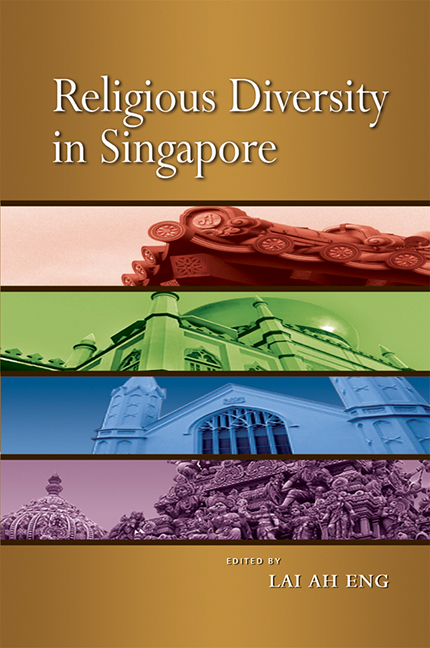Book contents
- Frontmatter
- Contents
- List of Figures and Tables
- List of Appendices
- FOREWORD
- PREFACE
- Acknowledgements
- The Contributors
- Abbreviations
- Glossary
- INTRODUCTION
- PART I The Landscape of Religious Diversity
- 1 Religious Influences and Impulses Impacting Singapore
- 2 Religious Trends and Issues in Singapore
- 3 Keeping God in Place: The Management of Religion in Singapore
- 4 Discourses on Islam in Southeast Asia and Their Impact on the Singapore Muslim Public
- 5 Global Christian Culture and the Antioch of Asia
- 6 “Religiously-inspired”, “India-derived” Movements in Singapore
- 7 Baha'is in Singapore: Patterns of Conversion
- 8 Diversities and Unities: Towards a Reformist Buddhism in Singapore
- 9 The Sathya Sai Baba Movement in Singapore: Its Service Mission and Philosophy of Communal Identity Construction
- 10 The Muslim Religious Elite of Singapore
- 11 The Evolution of the Sikh Identity in Singapore
- 12 Religious Processions: Urban Politics and Poetics
- PART II Religion in Schools and Among the Young
- PART III Religion in the Media
- PART IV Religious Organizations in Social Services
- PART V Interfaith Issues and Interaction
- Index
7 - Baha'is in Singapore: Patterns of Conversion
from PART I - The Landscape of Religious Diversity
Published online by Cambridge University Press: 21 October 2015
- Frontmatter
- Contents
- List of Figures and Tables
- List of Appendices
- FOREWORD
- PREFACE
- Acknowledgements
- The Contributors
- Abbreviations
- Glossary
- INTRODUCTION
- PART I The Landscape of Religious Diversity
- 1 Religious Influences and Impulses Impacting Singapore
- 2 Religious Trends and Issues in Singapore
- 3 Keeping God in Place: The Management of Religion in Singapore
- 4 Discourses on Islam in Southeast Asia and Their Impact on the Singapore Muslim Public
- 5 Global Christian Culture and the Antioch of Asia
- 6 “Religiously-inspired”, “India-derived” Movements in Singapore
- 7 Baha'is in Singapore: Patterns of Conversion
- 8 Diversities and Unities: Towards a Reformist Buddhism in Singapore
- 9 The Sathya Sai Baba Movement in Singapore: Its Service Mission and Philosophy of Communal Identity Construction
- 10 The Muslim Religious Elite of Singapore
- 11 The Evolution of the Sikh Identity in Singapore
- 12 Religious Processions: Urban Politics and Poetics
- PART II Religion in Schools and Among the Young
- PART III Religion in the Media
- PART IV Religious Organizations in Social Services
- PART V Interfaith Issues and Interaction
- Index
Summary
INTRODUCTION
There are at least 2,000 adherents of the Baha'i Faith in Singapore today. The Baha'i Faith is the youngest of the world's independent religions and the Baha'is are followers of Baha'u'llah (meaning “Glory of God”), the Prophet- Founder of the Baha'i Faith. This religious community has been registered in Singapore as an independent religious entity since 1952 (Spiritual Assembly of the Baha'is of Singapore, 1998), yet little is known about this nascent community.
The Baha'i Faith in Singapore had its beginnings in 1950 with the arrival of Dr and Mrs Shirin Fozdar from India (Spiritual Assembly of the Baha'is of Singapore, 2000). By 1952, there were a total of twelve declared believers, which was sufficient for the Baha'i community to form the first Local Spiritual Assembly. The election of the first governing body for Baha'i affairs took place in April 1952 and the Local Spiritual Assembly was duly incorporated in July of that year (Inter-Religious Organization, Singapore 2001).
There is neither priesthood nor clergy in the Baha'i Faith (Effendi 1974). The administration of the Baha'i world community is based on the unique system of Houses of Justice (or Spiritual Assemblies), which extends from the local to the international level. These elected bodies are responsible for ministering to the needs of the individual as well as the community at large. There have been very few studies carried out on the Baha'i community of Singapore. An academic exercise (Yeo 1980) focused on the phenomenon of witnessing from the angle of boundary maintenance, by looking primarily at the structure of the Baha'i community through a predetermined framework of a sectarian movement. Chew (1997) is a descriptive and research-oriented study focusing mainly on a comparison of Taoism and the Baha'i Faith and the former's impact on the latter. Chew (1996) has also written on the emergence of the Baha'i Faith in Singapore but more from a historical rather than cross-sectional perspective. The Spiritual Assembly of the Baha'is of Singapore has also published a brochure on the Baha'is in Singapore but the information is largely general and historical in nature.
- Type
- Chapter
- Information
- Religious Diversity in Singapore , pp. 167 - 194Publisher: ISEAS–Yusof Ishak InstitutePrint publication year: 2008



